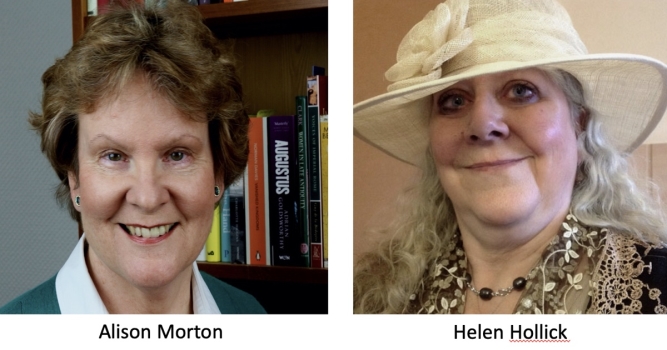We’re not supposed to write coincidences in our novels. Well, sometimes editors allow us one. But real life often brims with them. When I told my writing friend, Helen Hollick who writes historical fiction, that I was going off-piste from my usual alternative history novels to pen a contemporary conspiracy thriller, she confessed to writing a cozy crime story herself.

After the predictable mutual open-mouthed, dropped jaw staring session, we gathered our brains together and wondered what had happened to make us both turn to crime. Both of us had long running series, both had been writing for years and reckoned we’d probably got the hang of the technical and creative aspects of putting a story together. Readers seemed to think so and we had a fair few orange best-seller labels and various awards behind us.
Helen’s shift
A very well-respected author of Norman Conquest and Arthurian historical novels published in the UK and US, Helen excelled herself turning to the 17th century producing a series featuring a pirate called Jesamiah Acorne. He switched in and out of legality and morality, but although tough, he really was one of the good guys and became a pirate hunter himself. He worked with a varied team of rough and ready rogues, cultured, secretive characters and a mysterious lady-love and pursued adventures, tragedies and triumphs around the Caribbean. But he was always curious and always on a mission, not least one that would save his own neck.
Helen was equally curious and having sold her series to an American publisher and some foreign language rights, was looking for another path. She reached into her own back story which gave her the setting for A Mirror Murder.
Alison’s shift
Alison has six novels, two novellas and a collection of short stories in the Roma Nova alternative history series in her backlist. A ‘Roman nut’, she’d always wondered what a society would be like if a part of the Roman Empire still existed now. She threw in the twist of women running it today – more egalitarian-lite – but where men were not disadvantaged. Exploring all those mixed themes was fun, but it was the thriller element in the stories that dominated.
Very kindly, the community of historical fiction writers and some crime writers endorsed her work, but it was Conn Iggulden who threw her a challenge when he was reading INSURRECTIO for her. ‘You clearly have the knack for fast plotting tension. I kept coming back to see what happened next.’ He suggested I recast one of my alternative Roma Novan heroines as a member of a modern day European organisation and run the story as a crime thriller. So I did. Double Identity is the result.
But of course, these things are never that straightforward…
Communicating
Helen’s book is set in the 1970s which is considered a simpler age – no internet, no mobiles, no social media. Communication for Jan, Laurie and Inspector Christopher is by telephone, letter, meeting in person or notes left on a colleague’s desk. Granted, it’s a bit further on from the 17th century but it’s still pre-digital age. So perhaps not quite the jump into the 2020s when Alison’s characters, Mel and McCracken have all the digital communications paraphernalia plus video surveillance and analytical tools at the press of a key. But the investigator’s instinct and the human brain’s ability to connect is still at the forefront.
Social patterns
These, especially between men and women, are quite different. Helen’s Saxon England and 17th century world have strict moral codes. Despite the sexual revolution of the 1960s and 1970s, there is still a certain ‘old-fashionedness’ around in A Mirror Murder. Yet the mind-shift from one time to another is considerable.
In contrast, in Alison’s Roma Nova alternative timeline world, it was perfectly normal for women in the past to be Praetorian soldiers, prominent politicians and business leaders. In her new crime thriller, Double Identity, set in the ‘real’ world, even in the 2020s, sexism still abounds even if far more opportunities are open. Mel, the heroine, is after all an ex-French special forces soldier.
Research
This is the historical fiction writer’s constant bugbear as there are huge yawning gaps and as we know, history is written by the winners. But we have both found that the research task is not really much less. Memory is such a fallible liar; everything you know has to be double-checked. Well, it is unless you want readers to throw a bucket of one- or two-star reviews all over your Amazon page. The blessing for historical fiction writers is that we’re used to this; it’s second nature for every sentence or phrase you write.
To be credible you need to know how long it takes to drive in a 1970s police car from A to B (Helen) or how soon data can be sent from the other end of Europe (Alison). Mel in Double Identity carries a Glock, Jan and Laurie in A Murder Mysterynothing but their wits. All are investigators in a murder, but their tools and resources are quite different.
Has it worked?
Shifting genre involves shifting the writing mind, but the tools we possess or have developed such as working practices, approach to quality, pacing of work and ability to get ‘bum on seat’ to work through to the end of a draft are ingrained. We’ve both found the change absorbing and energising. Early readers and reviewers seem to like what we’ve produced, but as ever, it’s the wider readership that’s the final judge and jury.
Double Identity, published 7 January by Pulcheria Press, is available in ebook and paperback worldwide
A Mirror Murder, published 19 January by Taw River Press, is available in ebook (Amazon) and paperback
Websites: https://alison-morton.com https://helenhollick.net/